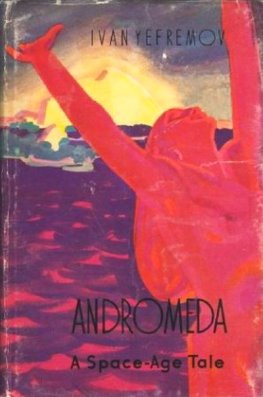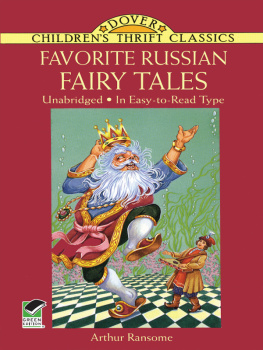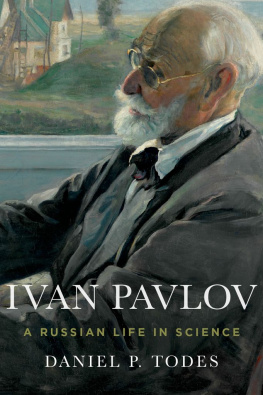Russian Folktales from the Collection of A. Afanasyev
.
A Dual-Language Book
Translated and with an Introduction by
SERGEY LEVCHIN
DOVER PUBLICATIONS, INC.
Mineola, New York
Copyright
Copyright 2014 by Dover Publications, Inc.
All rights reserved.
Bibliographical Note
Russian Folktales from the Collection of A. Afanasyev / . : A Dual-Language Book, first published by Dover Publications, Inc. in 2014, is a new selection of Russian stories reprinted from standard Russian texts and accompanied by new English translations prepared for the Dover edition by Sergey Levchin, who selected the stories and wrote the Introduction.
International Standard Book Number
eISBN-13: 978-0-486-78298-0
Manufactured in the United States of America
49392X01 2014
www.doverpublications.com
CONTENTS
INTRODUCTION
For the author tasked with introducing Russian folktales to the general readernative or foreignit has long become standard practice to begin with the ecstatic words of the tales great admirer A. S. Pushkin: ! ! How charming, these tales! Every one of them a poem!
It seems that Russias greatest poet had intuited the poetic spirit of the humble folktale, just as his countrymen were beginning to rethink their attitudes toward their much-maligned native cultureand furnished the rest of us with a very useful quotation. Just what is so especially charming or poetic about the rustic tale, told in a peasants hut and couched in crude dictionthat is, what sort of aesthetic pleasure it proffers to the educated contemporary readeris never discussed.
Indeed, at first glance, the folktale, reeling off one age-worn formula after another, seems wholly devoid of the charms of poetic invention. There is always a king who had three sons an old man and an old woman who have no children a beautiful princess kidnapped by a multi-headed serpent, and so forth. The kings youngest son is always named Ivan; this Ivan invariably sets out on a journey to find some magical item or renowned beautyand he succeeds every time. How is it that we never tire of hearing the same old story told over and over again or do we?
I think those of us who do not are paying attention not so much to the bare skeleton of the story, but to its distant rattle. We hear it coming from some place a very long way off and marvel at the strange and tortuous routes by which the tale has reached us in our own time. Behind the dated country-folk idiom and the characteristic mundanities of life in a peasants hut or a kings palacethe two perennial loci of the Russian folktalewe sense a strange spirit that seems to belong nowhere and everywhere at once.
To illustrate this point, let us take one of my personal favorite tales in this collectionThe Sea King and Vasilisa Most Ingenious. Its principal motifs i.e., the elements that comprise its plot (and a most convoluted plot it is)may be found piecemeal in virtually every collection of European folktales, as well as in the Kathasaritsagara, the eleventh-century collection of Indian legends, traced back to the ancient mythographers Ovid and Apollodorus, and finally all the way to the earliest records of the Sumerian people. Beyond that, there is no telling how far back this tale may go in the oral tradition, and what parallel routesoral and written it has traveled to reach us.
A folktale is Russian, or Indian, or Ancient Greek only very provisionally. We are in the presence of immortal storiesperpetually moving, breaking up, recombining into new tales, taking on new details and ornaments to suit the storytellers time and place, and the immediate needs and concerns of his audienceall the while remaining deeply ancient and deeply primitive, in the best sense of that word.
Even a reader who is not versed in the worlds folklore traditions will be able to sense something of this vertiginous depththe deep antiquity of the tale, and the long and secret routes it must have traveled to reach the Siberian muzhik and the American academic. At the same time, our reader should also take note of the peculiar work of adaptation and quilt-like recombination that these eternal stories undergo as they move between peoples and ages.
Once again, The Sea King offers an outstanding illustration: it is, indeed, a most remarkable patchwork of episodes. The tale begins with the fable-like account of a quarrel between a cunning mouse (woman) and a guileless sparrow (man); proceeds to a positively apocalyptic battle of birds and beasts; shifts to the story of a hunter who nurses a magical bird back to health and reaps the benefitsa more traditional fairy tale scenario, especially concerned with the upward mobility of the lower social classes; and moves on to the hunters bargain with the sea king Heathen Patean echo of the Biblical tale of Jephthahs daughter.
We are particularly delighted by the illegal intrusion of the storytellers mundane concerns into a patently timeless narrative: so, the age-old quarrel of the mouse and the sparrow, which quickly escalates into an all-out war between the animal and avian kingdoms, is sparked by dwindling supplies in a muzhiks barn. The shape-shifting eagle, king of the birds, gravely injured in mythical battle and sheltered by an ordinary merchant, consumes alarming quantities of food and drink in a single day, thereby ruining his benefactor. This characteristic clash of the magic world and the ordinary world, with their wholly incompatible scales and value systems, is reconciled most pragmatically by the storyteller: to raise the capital necessary to sustain his ward, the merchant must peddle the costly pelts of animals, slaughtered in the apocalyptic battle, left lying (for how many millennia?) on the battlefield.
Indeed, we can safely assume that this episodes hero is identified as a merchant precisely because he will be required to trade in large quantities of pelts. Moreover, in order to encounter the eagle, he must begin the episode as a hunter and later shift to merchant, as the story requires. In other versions of this tale, he may be a poor peasant, a prince, or a fair maidenand the problem of the eagles upkeep would be solved in other ways.
This capacity for variation and adaptation is an essential feature of the folktale; its survival and propagation are assured by a tradition that commands a wide range of stock characters, motifs, and situations, which may be reimagined and reinterpreted by storytellers to suit the needs and the pressing issues of the day. So, in the tale of Ilya Muromite (also in this collection) we will encounter the monster-usurper Idolishche, similarly taxing the resources of the Kievan Grand Duke: but here the imposition is cast as bondage rather than kind-hearted service, and the solution is suitably grim.
Finally, we must acknowledge the creative, often highly idiosyncratic work of the individual storyteller. Many of the tales in the East Slavic tradition exist in several dozen variants, recorded throughout the far-flung regions of the Russian Empire. And while the basic plot structure remains more or less the same throughout, each storyteller tries to elaborate the tale in his own manner and styleadding new details, inventing new characters, and interpreting and rationalizing episodes whose meaning and logic have become obscure to himtrying to infuse new life and freshness into the tale through a variety of techniques and embellishments.
Such interventions are essential to the aesthetic pleasure of the tale. Although we know many of the plots since our early childhood years, behind the old yarn we can sense the storyteller, a peculiar and inventive personality, grappling with material that is both old and very old, trying to make it new and infusing the old tale with an unexpected freshness.
Next page



